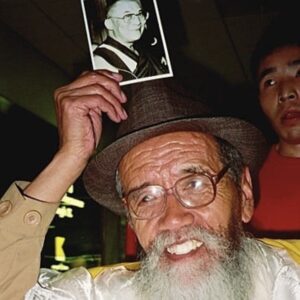 Takna Jigme Sangpo, Tibet’s longest served political prisoner, passed away on the morning of October 17 at his home in Turbenthal, Switzerland at the age of 91. Sangpo was a schoolteacher and political activist in the Tibetan capital of Lhasa before serving a total of 37 years in prison, starting from 1965. After his release in 2002, he sought asylum in Switzerland, where he continued to advocate for the Tibetan cause and for the release of political prisoners in China and around the world.
Takna Jigme Sangpo, Tibet’s longest served political prisoner, passed away on the morning of October 17 at his home in Turbenthal, Switzerland at the age of 91. Sangpo was a schoolteacher and political activist in the Tibetan capital of Lhasa before serving a total of 37 years in prison, starting from 1965. After his release in 2002, he sought asylum in Switzerland, where he continued to advocate for the Tibetan cause and for the release of political prisoners in China and around the world.
According to reports published by the Central Tibetan Government (CTA), Sangpo was arrested for the first time in 1965 after being charged for “corrupting the minds of children with reactionary ideas” in his teachings at Lhasa Primary School. Following his three year imprisonment and “re-education” at a labour camp, he was arrested again in 1970 for encouraging his niece, who was trying to flee to India at the time, to inform His Holiness the Dalai Lama on Chinese atrocities taking place in Tibet. He was released in 1979, and was then sentenced to fifteen years of imprisonment in 1983 for “spreading and inciting counter-revolutionary propaganda,” which was elongated by another five years for the same charges in 1988.
During the visit of an official Swiss delegation to his prison in 1991, he shouted the slogan, “Free Tibet!” from his cell, which brought him the punishment of a six week solitary confinement, a three year denial of civil and political rights, and eight additional years of imprisonment – totalling his ongoing prison sentence to 28 years. Although his planned release was in 2011, the Chinese government released him on medical parole in 2002 due to continued pressure from governments and international human rights groups. After receiving treatment for his deteriorating health and eyesight in the United States, he was offered asylum in Switzerland, where he has resided since 2002.
Sangpo issued a public statement in the summer of 2002, thanking the international community for their persistent efforts in bringing about his release. However, the International Campaign for Tibet also reports that he expressed grave concerns for his former fellow inmates, urging “the immediate release of all Tibetan political prisoners” and the international community’s “continued support for the Tibetan issue until there is a solution.” In his testimony at the United Nations Commission on Human Rights in 2003, the CTA reports that he again called for nations around the world to “help end the human suffering of the Tibetans,” urging that this help is needed “before it is too late.”




 Print
Print Email
Email